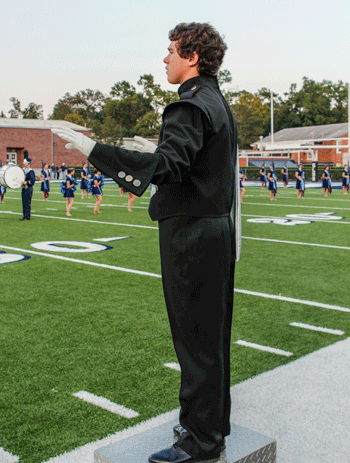Private conducting lessons as well as private practice sessions help one musician make a big impact on the podium.
Photo by Greg and Alisa Collins
A new part of my life had started: middle school. I walked into a large room filled with chaos and crazy kids, got my lunch and took a seat with my best friend, Evan. As we went into our daily conversation, he mentioned that he had joined band. He said that I should join band, and I quickly stated that it was not for me. I had already been playing hockey and soccer for years.
For the rest of the day, he bugged me to join band. I arrived home from school and gave the idea more thought and finally decided that I would give band a try. The next day at school, I was sitting in band class with my brother’s old trumpet, surrounded by kids who already knew how to play their instruments. I was clueless. At the time I had no idea that joining band would define who I became.
Moving Up
The next year, 7th grade, I was selected to march with our high school band at Gordon Lee Memorial High School in Chickamauga, Ga. The top players of each section were selected to march early with the high school. If you were not selected as a 7th grader, everyone had the opportunity to march in 8th grade. The years flew by, and soon the second semester of freshman year arrived. After much thought I came to the conclusion that I was going to try out for drum major.
After a serious talk with my mother, I signed up to take conducting lessons. Having the opportunity to work one on one with my teacher, Undra Finley, helped me to excel and achieve a broader knowledge of conducting. Weekly lessons allowed us to single out the problems quickly and fix them early on before they became habits. I highly recommend taking private conducting lessons. However, taking lessons does not give you a ticket to success. You must work hard outside of lessons, putting to use what you have learned.
Growing as a Musician
Learning to conduct has helped me grow as a musician more than anything else. Practice does not make perfect. Practicing properly makes perfect.
Here are some of the favorite practicing techniques that I learned.
- Familiarize Yourself: When I receive a new piece to conduct, the first thing I do is sit down at my computer, put the song on repeat and listen to it for hours. This routine may seem a bit crazy, but it helps more than you would think. As a conductor you must be the music. It is your job to communicate the music to the ensemble by using stylistic, dynamic and most importantly, emotional changes in your conducting. One way to tell if you have familiarized yourself with a song is to try and sing it all the way through aloud. First try to sing the melody all the way through. The next time you sing, try to sing the countermelodies and other parts.
- Make Contact: When you practice, put an imaginary ensemble in front of you. Move around, turn to cue in sections and use your upper body to make contact.
- Emote: Use facial expressions and stylistic changes in your conducting to effectively communicate the musical emotion to the ensemble. One day in band class when my director was absent, I led rehearsal. This was during concert season, so I chose the song that had the most stylistic and dynamic contrast throughout. The first run-through I simply conducted, relaying no emotion and very little dynamic change to the ensemble. The second time I communicated as much emotional, stylistic and dynamic contrast as I possibly could. The difference was astounding. As a conductor, you must be the music.
Trying Out
Before I knew it, tryout day had arrived. Competing against the two returning drum majors, I nervously walked into the room and positioned myself in front of the judges. I stared them in the eyes as I did my salute and then began my conducting routine. After the tryouts, a mass of people piled up outside the gym awaiting the results. As my band director, Burt Haynes, walked up and taped the results to the door, an eruption of gasps filled the air. All eyes turned to me.
Being a Leader
Being drum major as a sophomore was no easy task. Having to lead a band as an underclassman, I dared myself to always be confident. The first full ensemble practice arrived in no time. I stepped onto the podium for the first time and looked out to see the faces of my band family. I could not believe that I was drum major.
“Confidence is key,” my instructor would always tell me. Best. Advice. Ever. Now with conducting students of my own, I find myself saying this mantra in every lesson I teach.
My first year as drum major, I struggled with one thing more than anything else: trying to be perfect. Whether it was conducting-related or leadership-related, if I messed up, it scared me. I feared being called out or being told I was wrong. Although you should strive to do your best in all aspects, it is OK to make a mistake or be wrong sometimes; that is how you become better.
Always be open to being told what you can improve on and do not be afraid of messing up. Anytime you practice, do it like you are performing. Never stop pushing yourself to become better. Never give up.


